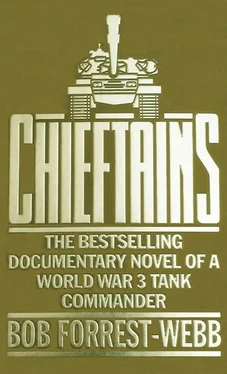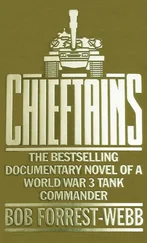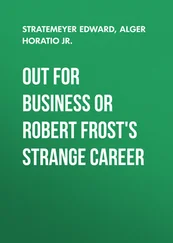‘Thank you.’
The adjutant had been listening to the conversation on one of the spare headsets. ‘Perhaps we should move back behind the river Ise, sir.’
‘Too early yet. If we pull back so far we’ll make life too easy for them.’
‘We won’t be able to hold them much longer, sir, nine more of the tanks are out of action. That leaves us with thirty-two, plus your own command Chieftain. There have been a lot of casualties amongst the infantry and the forward positions have just reported contact with Soviet patrols.’
Studley grimaced then said: ‘I’m going to look around. Let me know immediately if anything unexpected develops. We’ll move as soon as I get back.’ He wondered if it was conscience drawing him out of the command post; the thought of his men fighting for their lives on the lower slopes of the moor while he remained in a relatively safe position. Perhaps it would help their morale if they saw him alongside them for a while. Guiltily, he knew he was just seeking an excuse. He wanted to take part in some of the action, himself.
He walked outside. There was the sound of rifle and machine gun fire towards the east, and the sharp crack of hand-grenades. It was distorted by the heavier gunfire, but with its inference of close combat sounded more urgent and deadly.
An NBC-suited figure snapped to attention beside the Chieftain. ‘Sergeant Pudsey, are all the crew ready?’ Studley asked him.
‘Yes, sir. ‘They’re as twitchy as greyhounds in their traps. Want to be with their mates.’ Sergeant Pudsey was standing parade-ground straight. He acted as the colonel’s loader, and had the reputation of being one of the fastest in the regiment.
‘Let’s go then, Sergeant.’ Studley began climbing into the tank.
‘Yes, sir.’ There was pleasure in Pudsey’s voice at the command. He swung himself easily up on to the front of the hull and yelled at the driver’s hatch, ‘Drum her up, Horsefield.’
Studley waited until Pudsey had climbed inside and settled himself into his seat, and then followed. ‘We’ll give the infantry a hand, eh Sergeant,’ he shouted as Horsefield the driver stirred the Chieftain’s twelve-cylinder engine to life.
He slipped the headset over his beret, ignoring the helmet strapped to one of the seat supports. The helmet was too uncomfortable to be worn for long, and it was bad enough fighting in an NBC-suit. He switched on the tank’s intercom. ‘Load HE, Sergeant… Horsefield, take it easy when we get near the infantry positions. They know we’re coming down but it will pay to be cautious.’ He didn’t want some trigger-happy soldier to mistake the Chieftain for a T-80 and loose off a Milan missile in the heat of the moment. ‘We’ll use the long gulley at two o’clock. The infantry are about two thousand meters down the hill, and I don’t want to charge straight over their positions.’ He had checked the situation map before leaving the command post; Charlie Squadron and the infantry were close together. He would visit both and then work his way back around the lower side of the hill.
They had driven several hundred meters when he saw one of the battle group’s APCs overturned at the side of the gulley, with several corpses amongst the wreckage. It’s loss had been reported and Studley knew of the casualties, but it was still a gut shock to see the twisted metal and torn bodies that turned an impersonal radio message into brutal reality. He felt the hair on his neck bristle as though a chill breeze had caught him.
Horsefield avoided the debris of the APC and brought the Chieftain into the open ground of a fire-break. Two more APCs rested in the shelter of the bordering trees, their crews kneeling or squatting beside them, waiting until the infantry needed them again. There were craters in the narrow clearing, still hazed with smoke.
Studley halted the tank and signalled over a drawn-looking lance corporal who had been squatting beside the front of one of the APCs, his Sterling Mk4 tucked ready beneath his arm. The man smartened himself and saluted, recognizing the colonel.
‘Much trouble, Corporal?’
‘Mortars, sir. They got the APC on the hill, and we lost one of our own men, sir. We haven’t seen a bloody Russian yet, sir.’
‘I don’t doubt you’ll see them soon enough.’ Studley was having to shout to make himself heard above the sound of the fighting lower in the wood. The heavier gunfire was now to the left, but there were mortar and grenade explosions no more than four hundred meters away.
‘Are we holding them, sir?’
‘Leading them, Corporal. Leading them.’ Studley made himself sound cheerful. ‘That’s the way we’re playing this game.’
There was no reaction on the lance corporal’s face to Studley’s words. He doesn’t believe me Studley thought to himself. They had code-named the battle plan ‘Hamlin’ after the town where a mythical piper had once led away a plague of rats to the sound of his flute. Hold and withdraw, hold and withdraw; forcing the enemy to use maximum effort at all times, and turning the head of the thrust cunningly so that the enemy was drawn along a route already decided by the NATO forces. The final traps were the killing zones, minefields covered by all the fire-power the NATO ground and air forces could muster. He ordered the Chieftain on, then watched for a moment as the lance corporal saluted briefly and turned to hurry back to the cover of the APC.
The Chieftain had entered the fire-zone, the shredded trees, the mist of battle, the sounds of death. Studley saw his first Soviet infantrymen two hundred meters ahead; scurrying, half-crouched, to the cover of a low wall. He decided they must be part of an artillery observation team, known to operate well up with the assault troops. He gave their position to Riley, the gunner, and then watched with satisfaction as the HE shell destroyed a five meter section of the wall and tumbled bodies out into the open.
Riley said quickly, ‘Traversing right one o’clock, sir.’ He swung the turret and brought the Chieftain’s gun to bear on a personnel carrier that was one of several thundering diagonally across a broad flat field that had contained root crops less than two weeks previously.
Studley switched the radio to the group net. ‘Hullo Charlie this is Sunray Rover One.’ He heard Captain Valda Willis, Charlie Squadron’s leader, acknowledge. ‘Charlie Nine, this is Sunray Rover One, expect Wolves twenty degrees right your position. BMPs, over.’
‘Roger Sunray Rover One, we see them. We are engaging, over.’
‘Roger Charlie Nine, out.’ Damn, thought Studley. He shouldn’t have interfered. Obviously Charlie Squadron hadn’t been sitting there with their eyes closed; they would be all alert, keyed-up, waiting for targets. Now, they would probably think he had been keeping an eye on them, looking for an opportunity to criticize their performance.
‘Sir…’ Corporal Riley’s voice drew his attention. The gunner was thinking that if he didn’t get a shot in quickly, then the BMPs would be annihilated within the next few moments by the squadron’s guns.
To the gunner’s relief, Studley said: ‘Take it out, Riley.’
The Chieftain kicked, and Studley watched the front of the leading BMP disintegrate, half of one of its tracks scything eight meters into the air. The vehicle burst into flames, then blew to pieces as the ammunition of its 73mm gun exploded. The Soviet attack, he thought, was a foolish waste of manpower and vehicles; to use unsupported mechanized infantry against deployed armour was suicidal.
Riley was seeking another target, but already a further three of the BMPs had been hit. A fourth the corporal was ranging on was demolished before he could fire.
Some of the infantrymen had survived the destruction of the vehicles, but the battle group’s machine guns and rifles concealed in the woods were picking them off.
Читать дальше












